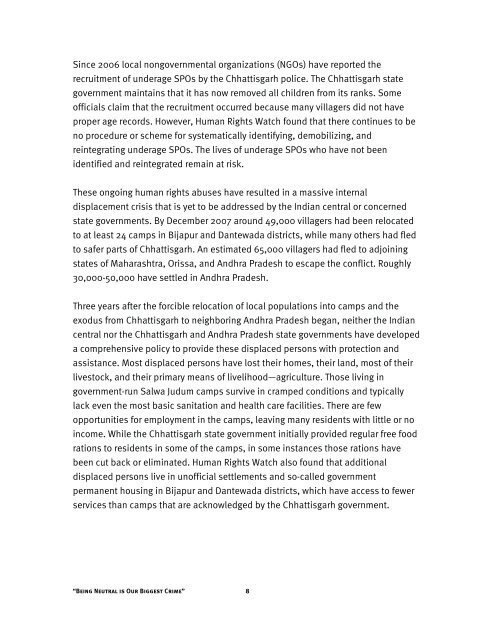âBeing Neutral is Our Biggest Crimeâ - Global Coalition to Protect ...
âBeing Neutral is Our Biggest Crimeâ - Global Coalition to Protect ...
âBeing Neutral is Our Biggest Crimeâ - Global Coalition to Protect ...
Create successful ePaper yourself
Turn your PDF publications into a flip-book with our unique Google optimized e-Paper software.
Since 2006 local nongovernmental organizations (NGOs) have reported the<br />
recruitment of underage SPOs by the Chhatt<strong>is</strong>garh police. The Chhatt<strong>is</strong>garh state<br />
government maintains that it has now removed all children from its ranks. Some<br />
officials claim that the recruitment occurred because many villagers did not have<br />
proper age records. However, Human Rights Watch found that there continues <strong>to</strong> be<br />
no procedure or scheme for systematically identifying, demobilizing, and<br />
reintegrating underage SPOs. The lives of underage SPOs who have not been<br />
identified and reintegrated remain at r<strong>is</strong>k.<br />
These ongoing human rights abuses have resulted in a massive internal<br />
d<strong>is</strong>placement cr<strong>is</strong><strong>is</strong> that <strong>is</strong> yet <strong>to</strong> be addressed by the Indian central or concerned<br />
state governments. By December 2007 around 49,000 villagers had been relocated<br />
<strong>to</strong> at least 24 camps in Bijapur and Dantewada d<strong>is</strong>tricts, while many others had fled<br />
<strong>to</strong> safer parts of Chhatt<strong>is</strong>garh. An estimated 65,000 villagers had fled <strong>to</strong> adjoining<br />
states of Maharashtra, Or<strong>is</strong>sa, and Andhra Pradesh <strong>to</strong> escape the conflict. Roughly<br />
30,000-50,000 have settled in Andhra Pradesh.<br />
Three years after the forcible relocation of local populations in<strong>to</strong> camps and the<br />
exodus from Chhatt<strong>is</strong>garh <strong>to</strong> neighboring Andhra Pradesh began, neither the Indian<br />
central nor the Chhatt<strong>is</strong>garh and Andhra Pradesh state governments have developed<br />
a comprehensive policy <strong>to</strong> provide these d<strong>is</strong>placed persons with protection and<br />
ass<strong>is</strong>tance. Most d<strong>is</strong>placed persons have lost their homes, their land, most of their<br />
lives<strong>to</strong>ck, and their primary means of livelihood—agriculture. Those living in<br />
government-run Salwa Judum camps survive in cramped conditions and typically<br />
lack even the most basic sanitation and health care facilities. There are few<br />
opportunities for employment in the camps, leaving many residents with little or no<br />
income. While the Chhatt<strong>is</strong>garh state government initially provided regular free food<br />
rations <strong>to</strong> residents in some of the camps, in some instances those rations have<br />
been cut back or eliminated. Human Rights Watch also found that additional<br />
d<strong>is</strong>placed persons live in unofficial settlements and so-called government<br />
permanent housing in Bijapur and Dantewada d<strong>is</strong>tricts, which have access <strong>to</strong> fewer<br />
services than camps that are acknowledged by the Chhatt<strong>is</strong>garh government.<br />
“Being <strong>Neutral</strong> <strong>is</strong> <strong>Our</strong> <strong>Biggest</strong> Crime” 8
















